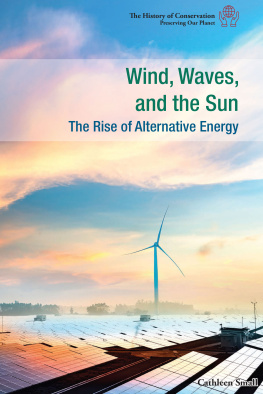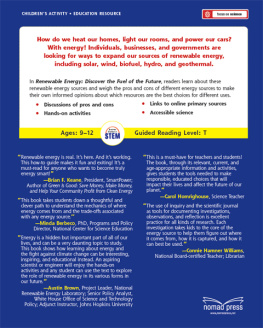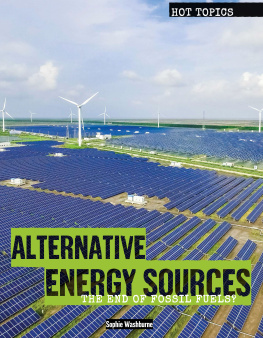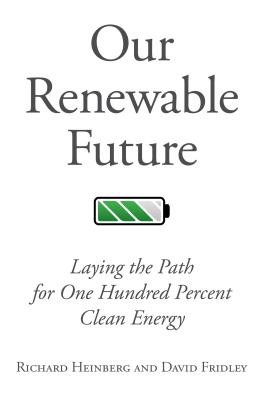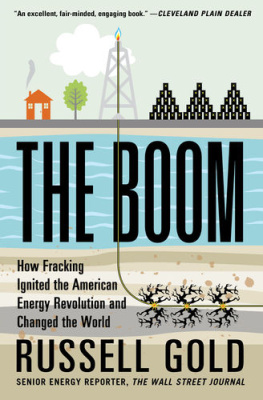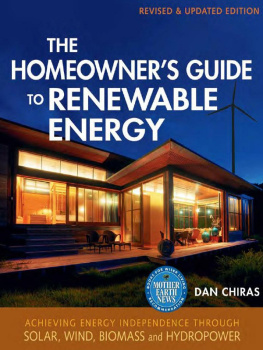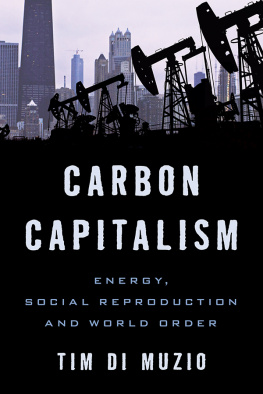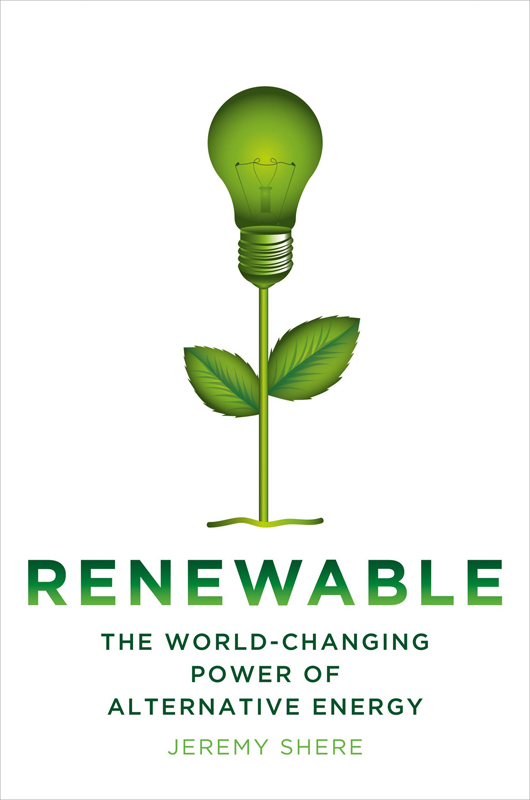
The author and publisher have provided this e-book to you for your personal use only. You may not make this e-book publicly available in any way. Copyright infringement is against the law. If you believe the copy of this e-book you are reading infringes on the authors copyright, please notify the publisher at: us.macmillanusa.com/piracy.
To my Barre, Gav, and Yoni, who give life meaning and make everything seem possible
CONTENTS
INTRODUCTION
The idea for writing a book about renewable energy first struck me when my cara 97 Honda Accorddied on my way back from Indianapolis to Bloomington, Indiana, where I live. The engine coughed once, sputtered gently, then simply shut down. I wasnt particularly upset; the car had served me faithfully for the past twelve years, and now its time had come.
But even as I pulled off onto the highway shoulder I began to fret about the most obvious consequence of my cars demise: having to buy a new one. It wasnt the expensethanks to the recession, car prices had never been lower, and wemy wife Barre and Icould afford a reasonable monthly payment. No, my anxiety had more to do with what kind of car we should be driving. Gas-electric hybrids were all the rage and seemed like a smart, environmentally conscious option. But what about a flex-fuel car, whatever that was? Was it worth considering an all-electric car? Was it even possible to get an electric car? (This was before the Chevy Volt and the Nissan Leaf hit the market.)
I realized, after several late nights spent poring over used-car Web sites and Consumer Reports ratings, that figuring out what kind of car to buy was really a matter of deciding what sort of energy consumers we wanted to be. With memories of $4.30-per-gallon gasoline fresh in mind, buying a car that simply guzzled gasoline seemed, well, somehow wrong. Or maybe pass. Surely it made sense to get a hybrid, like all the shiny new Toyota Priuses wed seen gliding quietly around our neighborhood. But given the relatively small amount of time we actually spend driving around our small, bike-friendly college town, the little money wed save on gas just didnt add up. Plus, hybrids are expensivewed pay a premium for the brand name. Same goes for flex-fuel cars that run on gas thats up to 85 percent corn-based ethanol and 15 percent regular gasoline, or E85. (Another deterrent: not all gas stations sell E85. In 2008 there were around 1,600 such filling stations in the United States, but none in Bloomington.) The only all-electric plug-in was the Tesla Model S, which went for a cool $50,000just a tiny bit out of our price range. As far as I knew, cars powered by hydrogen fuel cells existed only as prototypes.
Finally, after endless hemming and hawing and several sleepless nights (hard to believe, but true), we settled on a new Honda Civic with a fuel-efficient but decidedly nonalternative, gasoline-consuming internal combustion engine. Although our new car was state of the art, got roughly as many miles per gallon as a hybrid, and will probably keep us rolling for the next twelve years with minimal problems, it still felt like a letdown. Or, more accurately, my wife and I both felt that wed somehow failed to take the leap and boldly join the coming revolution in renewable energy. Wasnt it our duty, as environmentally conscious, well-educated Americans, to do our bit? Was it not worth paying a little more for a hybrid car if for no other reason than to contribute to what seemed like the wholly righteous movement toward renewable fuels and alternative sources of energy that will wean us off oil and other climate changecausing fossil fuels?
The answer to that question was not at all obvious. (To be honest, it still isnt.) But what is clear is that the commonplace experience of shopping for a car made me aware for the first time in a truly visceral way that how we produce and consume energy is an everyday concern in my, in yourin our everyday lives. As a journalist and a science writer Id read a lot about renewable energy and interviewed dozens of scientists working on a wide range of new energy technologies. Compared to the average person, I was fairly well informed about the latest trends and advances in renewable energy. But that knowledge didnt really hit home. I still had only a cursory idea of where and how the energy we consumed in our house and on the road was produced. And although I knew something about biofuel, solar cells, wind power, hydrothermal technology, and other forms of renewable energy, I didnt have a clear sense of the big picture, of howor ifthe dozens of alternative energy technologies we hear so much about every day really added up to something new and viable. I was almost completely in the dark about how these technologies would make a real difference in our lives in the near, mid-, and long-term future. Until, that is, shopping for a new car and negotiating the myriad energy-related options at play brought home the realization that renewable energy is no longer the stuff of science fiction. Its here, now, slowly but surely changing the world in ways large and small.
Not all of those changes, though, are as obvious as the advent of hybrid vehicles or the wind farms cropping up around the world. Some are more subtle, like the increasing amounts of ethanol now routinely blended in with regular gasoline and the dozens of power stations across the country that have quietly switched to burning alternative fuels. Other advances in alternative energy are so new that theyre still in development, at least a few years or even decades away from having a real and noticeable impact on peoples lives. But the fact that energy research happening in labs and boardrooms and testing facilities across the country and around the world today will change our lives in the near future got me thinking hard about how all of this will play out as the twenty-first century unfolds.
As a science writer, Im curious. I want to know whats going on in the labs, whos on the brink of discovering an incredible new source of renewable energy, which promising technologies are for real and which are merely pipe dreams. But beyond professional curiosity, as a citizen and especially as the father of two small boys who will grow up to inherit an energy economy very different from the one Ive lived with, I feel an urgent duty to know , to learn what I can about how and why the way we produce and consume energy is changing, and what this means for me, for my kids, for everyone. The subject of Energy with a capital E is so big, so complex and overwhelming, that it often seems impossible to get a handle on the myriad crises and challenges facing us as we tentatively begin to transition away from fossil fuels and toward renewable alternatives. After all, unless youre a high-powered scientist or CEO or policy bigwig, what can one person actually do to sway the course of events? What difference can you, or any normal person, make?
The answer is that you and I can make a difference, and the first step toward being more than merely a passive observer or ignorant consumer is to learn what renewable energy is really about: where its headed, why it matters, and how its already changing the world.
That, in short, is what this book is about: navigating the ins and outs of renewable energy to inform, engage, and give readers a handle on the science, technology, and especially the story of alternative energy. My hope is that readers will feel empowered to be active participants in the quickly evolving energy economy. But achieving this wont be easy. Because to even begin to scratch the surface of renewable energy research and development is to become enmeshed in a complex jumble of new, competing ideas and technologies that change rapidly from year to year and even month to month. Anyone whos been paying even scant attention can probably tick off the major players: solar, wind, geothermal, biofuel, hydropower, and so on. But what these concepts actually meanhow, if at all, they function as viable, working technologies; what they consist ofis far more complex than it might seem at first blush. Take biofuels, for example. For roughly the past decade in the United States, the ethanol industry has focused on producing fuel from corn. Now, in the aftermath of the so-called food versus fuel debate, attention has turned to cellulosic ethanolfuel made from nonedible green plants, like kudzu or switchgrass. And some visionary entrepreneurs have rethought biofuels entirely, seeking to squeeze oil from cultivated algae. Navigating the world of biofuel research is tricky, not only because the science and technology change so rapidly but because, as with any industry in its infancy, its great promise is tempered by great uncertainty.


